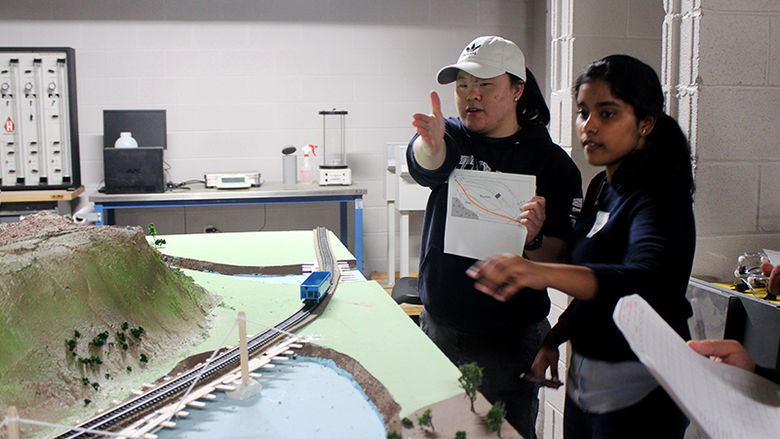Penn State Berks will host the American Society of Engineers (ASME) Anthracite–Lehigh Valley Section Student Competition from 5 to 7 p.m. Thursday, March 30, in the Gaige Technology and Business Innovation Building. This event is open to ASME members, and a light meal will be served.
During this event, mechanical engineering students will showcase “real-world” projects completed as part of their senior capstone course, along with students from other local colleges including Lafayette College, Lehigh University, and Wilkes University, to name a few.
According to Ed Sauer, instructor in engineering at Penn State Berks, students enrolled in the Mechanical Engineering degree program must complete a project for their senior capstone course. Some of these projects are generated by the Berks Learning Factory, an academic center within the college that integrates industry-sponsored design projects into both first-year and senior engineering design courses. Students can also choose to complete undergraduate research as part of the senior capstone course.
Currently 27 students in the mechanical engineering senior capstone are working in teams on the two-semester projects, which are listed below. All projects are expected to be completed by May 2017.
Quadrant Engineering Plastic Products, a global manufacturer of high performance, high temperature plastic materials based in Reading, Pennsylvania, enlisted the Berks Learning Factory for assistance in the automation of its production process. In the first project, students are building a device that will feed plastic rods through manufacturing machinery. In the second, students are working to automate the spraying process, creating a framework that holds a spray gun, using programmable motors and a computer-controlled interface.
Another international company based in Wyomissing, Pennsylvania, signed up with the Berks Learning Factory for assistance in developing a machine sensor for use in installing insulation on industrial roofs.
In addition to industry sponsored projects, one group of students is preparing to compete in Tennessee Tech University’s Human Powered Vehicle Challenge (HPCV). In the HPCV, students work in teams to design and build efficient, highly engineered vehicles for everyday use. Berks students are working with Rungun Nathan, associate professor of engineering and mechanical engineering program coordinator, to build a continuously variable transmission for a bicycle.
Another team of students is working with Azar Eslam-Panah, assistant professor of mechanical engineering, on a project that will be tested in the new Fluid Discovery Laboratory, a new facility that Eslam-Panah developed with the help of the mechanical engineering students. For this project, students will build models of three campus buildings. The models will then be submerged in a water channel in order to determine how building location and proximity influence air currents by measuring water flow.
Yet another group is working with Matthew Rhudy, assistant professor of engineering, on a project for use in the new Human Movement Research Center. They are tasked with correlate motion sensors at multiple locations on the body.
In the final project, students are working with the Media Commons, a division of the Center for Teaching and Learning with Technology located within the Thun Library, on a project to reduce background noise in the studio.
About Penn State Berks
Penn State Berks, the only college in Berks County that offers engineering degrees, is one of only four Penn State campuses to offer bachelor of science degree in mechanical engineering. The degree program has been accredited by ABET, the global leader in accreditation of engineering, engineering technology, computing and applied science programs.
The bachelor of science in electro-mechanical engineering technology degree is offered in response to a growing demand from industrial and consulting companies for engineering staff members with a wide range of technical knowledge. Only four other schools in the nation, other than Penn State, offer a baccalaureate degree program combining electrical and mechanical engineering technologies, and none of these schools are located in Pennsylvania.


